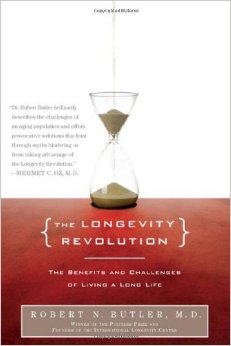 One of the most useful books I read in preparation for a recent talk I gave on longevity was The Longevity Revolution, published in 2008 by Robert N. Butler, M.D. Apart from being a Pulitzer Prize winner, Dr. Butler is also the founder of the International Longevity Centre.
One of the most useful books I read in preparation for a recent talk I gave on longevity was The Longevity Revolution, published in 2008 by Robert N. Butler, M.D. Apart from being a Pulitzer Prize winner, Dr. Butler is also the founder of the International Longevity Centre.
The book is subtitled The Benefits and Challenges of Living a Long Life. Butler observes that in less than 100 years, human beings have made greater gains in life expectancy than it did in the preceding 50 centuries. From the Bronze Age to the end of the 19th century, life expectancy grew by only 29 years or so, from 20 to just under 50 years. But in the 20th century, Life Expectancy surged another 30 years to reach over 77.
The paradox of a downside to what should be good news
And yet he notes that despite this seemingly wonderful news — and prospects for still longer lives — this change has not been greeted with total enthusiasm. In the U.S., where the book was published, longevity gains have caused some pundits to question whether modern industrial nations can afford old age as a society. Programs like Social Security and Medicare are under pressure and would be even more so if these gains keep happening. Centenarisns (those who have reached 100) are the most rapidly increasing age group, with 72,000 alive today (2008) and projections of nearly a million by 2050, when the baby boomers are in old age.
While 85% of those centenarians are women, gender differences in life expectancy disappear at age 105 (“super centenarians”), at which point both sexes have an equal chance of living on, according to Dr. Butler. Furthermore, the longevity revolution is a worldwide phenomenon: by 2025 80% of all persons over 65 will be in the developing world.
One of the challenges this revolution is bringing is financial. I was pleased to see Dr. Butler refer to financial independence in this passage:
“If the growing numbers of older persons were all financially independent and enjoying good health, there would be no challenge. A significant minority, however, is not so fortunate.”
Longer lifespan implies longer workspan
One likely remedy is that many elders formerly viewed as unproductive seniors will choose to continue to work, if only part-time or in encore careers. After all, if we are indeed granted 10, 20 or more years of life than we once may have imagined, and many of those extra years are vibrant and healthy ones, it makes sense to stay productive longer. This in turn would alleviate the financial problems of trying to make investment portfolios last four or five decades, and also take the demographic pressure off programs like Social Security or Canada’s CPP/OAS.
Butler puts it this way:
“Since people are living longer, it makes sense that they should work longer, increasing the amount of money going into the Social Security trust funds while simultaneously reducing the outflow.”
As of 2008, the average 65-year old man can expect to live to 81 and woman 85, the book says. But remember that Life Expectancy is a statistical structure like the “median”: half can be expected to live past that age, and half will pass away sooner. The term is not the same as “Lifespan,” which refers to the maximum age reached by the most robust human: for example, France’s Jeanne Calment lived to: 122. Wikipedia has a good definition of Life Expectancy here.


